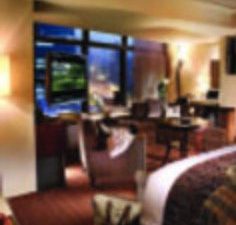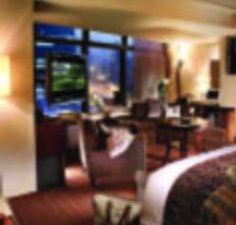Staying power
July 29, 2017

Two things we know about serviced apartments. One, it’s a growing industry segment numerically and geographically; and two, it’s gaining a wider acceptance among business travelers.
According to the latest Global Serviced Apartments Industry Report 2016/17, prepared by the TAS Alliance, a collection of operators and vendors, 88 percent of companies now used apartments for “one business reason or another.”
The report found there are now over 800,000 units in the sector – which may fly the flag of serviced apartments, aparthotels, corporate housing and other appellations. That’s an increase since the last GSAIR report of 10.5 percent worldwide. In the US, according to the report, the sector’s revenues were $2.93 billion in 2015, a 7 percent increase over 2014.
The report shows that about two thirds of corporations use serviced apartments for business travel. The reason: Long-term housing is simply the most productive choice for a variety of business travel needs – most commonly relocations, project work and training. As a consequence, the average corporate housing stay in the US was 84 nights in 2015.
The reasons for booking long-term serviced apartment stays differ geographically, according to the GSAIR. In Europe, just under half of stays were for project work, and a third for relocation, while in the US, relocation was the most frequent reason to stay in corporate housing, followed by interns.
Several positive trends are emerging in the sector: The increasing ease and flexibility of booking and using long-term housing, plus enhancements to safety and security, and the possibility of substantial cost savings.
Still, there are plenty of people who wouldn’t automatically think about trying a serviced apartment. To make themselves more attractive to business travelers – and attract a wider variety of these travelers, from all generations – serviced apartment operators are working hard to strengthen their branding.
“We are a young industry and can still see rapid growth,” says Aneal Sadiq, head of sales for House of Fisher, a UK-based operator of corporate housing. “We have doubled our product offerings in just a few years and the same can be said for our competitors.”
Room to Breathe
The basic selling points for serviced apartments have remained consistent: more space, privacy and the freedom to cook when you want. They offer the allure of familiar creature comforts and the ability to live more like a local. And of course, there is the cost benefit of lower rates for longer stays, which can result in dramatic savings for the company.
The business model keeps rates low in comparison to hotels of similar quality, says Jo Layton, managing director for The Apartment Service, a UK-based supplier. “Demand for serviced apartments (with a goal of seven-night minimum stays) can achieve the same discount rates as an air crew accommodation would achieve in a busy hotel, i.e., they give a great occupancy base so their business is welcomed.”
Ironically, some travelers are leery of these housing options because of lower costs. Elle Cane, vice president-business development for Master Key Alliance, a Toronto-based third party provider, says some clients have to be educated about the fact that the product has much lower overhead.
Rapidly expanding sharing companies led by Airbnb are eager for bigger piece of the business travel pie. Just how threatening Airbnb is to hotels in the next few years, however, will likely hinge on the company’s success in converting business travelers into regular Airbnb users, according to a recent report from Morgan Stanley.
“There are now many questions being posed to the large aggregators regarding how sustainable these products are,” Layton says. “The aggregators are having to follow city and environment rules and regulations with regards to restricted maximum number of room nights and/or revenues that can be booked. This will impact on availability of product. And from a corporate social responsibility standpoint, how are the host and their products being checked for health and safety, tax compliance and sustainability as a supply chain for the travelers? There remain many unanswered questions.”
The shared economy may actually play into the strengths of the traditional corporate housing providers, says Patricia Hintze, vice president, global sales for Oakwood Worldwide. “Once people are open to an apartment we see them taking other factors into consideration, including service levels, Duty of Care, consistency in quality, permitted and licensed locations, clarity in pricing, etc., that still make corporate and serviced apartments stand out.”
And some suppliers see Airbnb as just another online travel agency. Global operator Bridgestreet was the first to partner formally with Airbnb’s corporate program, Airbnb for Business, which means its inventory can be booked by Airbnb clients. “Some of us have embraced Airbnb and listed ourselves on their sites,“ notes Sadiq of the House of Fisher.
Think Local, Live Local
The inroads made by Airbnb may be at least in part responsible for the launch of a number of new brands from serviced apartment providers.
According to a report from Serviced Apartment News, providers will continue to create hybrids incorporating elements of corporate housing and hotels – like BridgeStreet’s Mode and SACO’s more recent Locke aparthotel brand launches. Others include the Prem Group’s Premier Suites and Premier Suites Plus, and Apple Apartments’ Exclusive brand, which features only luxury properties, just some of the brands that will contribute to the blurring of the lines between serviced apartment and select service hotel categories in 2017.
And as with hotels, there is a greater focus on connecting locally. “Even though you’re away from home, you still need to know where the Walgreens is, and where to get a haircut,” says Loren Nalewanski, vice president and global brand manager for TownePlace Suites by Marriott. “We have our interactive map right in the lobby that’s bigger than life and shows where everything is.”
Candlewood Suites properties has launched a Local Finds section in the Candlewood Cupboard which provides guests with regionally produced items such as BBQ sauce or beverages. “We know that when traveling, guests are looking to truly experience the destination they are visiting more now than ever through cuisine or activities,” according to Jennifer Gribble, who is vice president for several IHG brands.
AKA has a Live It! program which allows their guests to explore all the amenities a particular city has to offer. The offering lets residents “live like a local” and have the opportunity to learn new skills and develop new talents through special events. Another AKA gambit that echoes trends in hotel design is a communal space called the a.lounge. It is a ‘common’ space for residents to relax in, where coffee and tea are served in the mornings, and a selection of wines in the evenings.
In fact, corporate housing properties are starting to feel more like hotels of all kinds, not just extended stay. And conversely, hotels have changed in dramatic fashion in recent years – moving toward more communal space, a focus on design, and targeting the fast growing Millennials segment. And long-term housing is also making moves in those directions.
“Typically corporate housing could be seen as cold but we are adding bits of value to our proposition that are warm and fuzzy and personalize the stay,” Sadiq notes. “It’s about providing people with a true living environment.”
“While our customers are in their units quite a bit they do want lounges, especially if they are part of a group,” notes Craig Partin, chief sales officer for corporate housing supplier Furnished Quarters. “Apartment communities have always had some kind of club room. They were a selling point that few people used; and now they are used so we have changed what’s in them. We have large-screen TV’s, more WiFi connectivity and so on. “
Still, visibility is where hotel groups with extended-stay products, such as Marriott, Accor and Intercontinental Hotels Group, have a clear advantage. John Wagner, founding partner of hotel management company Cycas Hospitality, which works with
IHG’s Staybridge Suites, says: “[It] enables immediate awareness and recognition, particularly in areas where the extended stay sector is less well known.”
At TownePlace Suites by Marriott, where fully 42 percent of stays are longer than five days, Nalewanski says they offer attributes similar to serviced apartments: large rooms and kitchens. They also provide full hotel services like front desks, daily housekeeping loyalty points, etc.
Russell Kett, chairman of hospitality consultancy HVS, cites the opening of properties by some large groups that include both serviced apartment and hotels in one property. “They’re focusing on both aspects of that market; people that want a straight hotel and those that want a serviced apartment.” In April, UK operator Staying Cool partnered with luxury group Bespoke Hotels, announcing plans to open mixed-use developments that combine hotels and serviced apartments.
Overall, even long-term stays are shorter. According to the PwC Talent and Mobility: 2020 and Beyond report, 20 percent of assignments now last less than 12 months compared with 10 percent in 2002. With a trend toward shorter stints in temporary housing, hoteliers are moving more aggressively into the market. Sometimes hotels enjoy advantages like locations in markets that will not support upscale corporate housing.
For instance at IHG, which operates Staybridge Suites and Candlewood Suites, Gribble notes one big change is significant expansion into urban location like Los Angeles and Las Vegas in the west, and Philadelphia and Atlanta in the east.
And Bill Duncan, global head, all suites brands for Hilton, agrees: “Hilton’s All Suites brands are also in the midst of a rapid expansion with a focus on entering into more urban areas to meet current traveler demand.”




